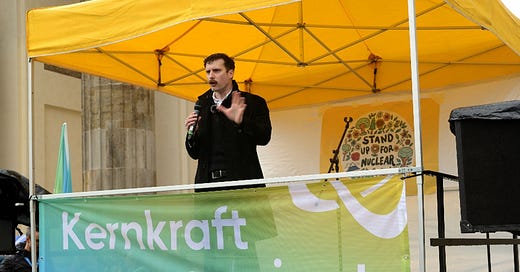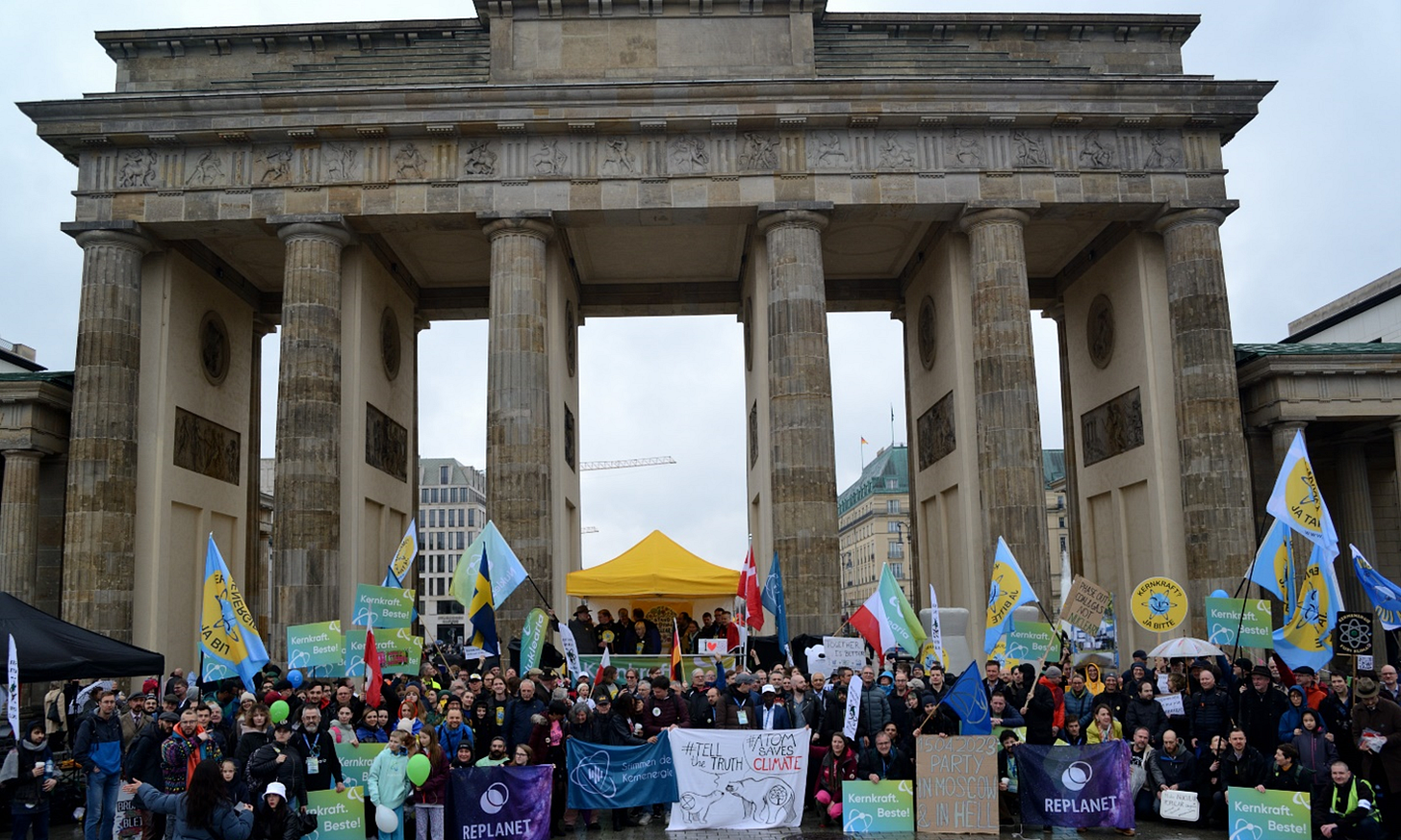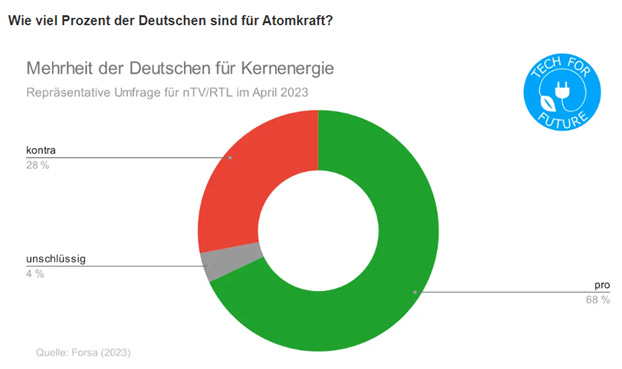This week, the Green Party of Germany is celebrating the culmination of their 30-year quest to close Germany’s entire fleet of nuclear power plants. For many, it feels like a funeral for a friend that has passed-away prematurely. On April 15th, Emsland Nuclear Power Plant was shut down at about 10 pm (22:00 hrs.), Isar II Nuclear Power Plant was shut down at about 11 pm (23:00 hrs.) and Neckarwestheim II Nuclear Power Plant was shut down a few minutes before midnight (23.50 hrs.). These nuclear power plants were not closed because they were old or in dis-repair or unsafe. According to Mark Nelson of the Radiant Energy Group, “….the German nuclear power plants where among the finest and best maintained nuclear power plants in the entire world and could have continued operating safely and efficiently for decades or longer.”
Mark Nelson speaking in Berlin on April 15th, 2023; his Reagan-esque comment was “Open these plants Mr. Habeck!” (calling on Green Party Leader Robert Habeck to re-open Germany’s nuclear power plants)
These “industrial cathedrals of clean energy” were prematurely closed for purely political reasons in support of incomprehensible energy policies of the ruling parliamentary coalition and in particular the Green Party of Germany. These closures are especially ironic in a country that has spent an enormous sum of money on wind and solar projects during the last 20+ years, ostensibly to fight climate change. Nevertheless, during the worst energy crisis in 50 years, Germany has closed its only source of reliable, dispatchable and virtually carbon free electricity.
Note: “Industrial Cathedrals of Clean Energy” is a term credited to Emmet Penney, host of Nuclear Barbarians Podcast and Editor-in-Chief of Grid Brief.
Germany opened its first nuclear power plant in 1969. At the pinnacle of its nuclear power preeminence, Germany operated 17 nuclear power plants providing approximately 30% of Germany’s electricity. However, after the Chernobyl nuclear reactor accident in the Ukraine in 1986, Germany started to re-assess its nuclear power program. Greens started to push for a phase-out of nuclear power. In 2011, the nuclear accident at the Fukushima Daiichi Power Plant in Japan, sealed the fate of German nuclear power and the German parliamentary coalition decided to move forward with an audacious and tragic plan to phase out its entire fleet of German nuclear power plants.
Note: Japan’s 2011 earthquake and Tsunami killed approximately 18,500 people. Two workers at the Fukushima Daiichi Power Plant were drowned; ironically, most people are unaware that there were no deaths from radiation as a result of the Fukushima accident; deaths only occurred as a result of the earthquake, resultant tsunami and the hasty and unnecessary evacuation of people.
Within the past 16 months, Germany has closed its last six operating nuclear power plants. Germany had originally intended to replace its retired nuclear power with power generated from “renewable” forms of energy like biofuels (burning wood and trash), wind and solar. Unfortunately, wind and solar only generate power intermittently and utility scale battery technology is unavailable to power the grid when wind and solar are AWOL. Illustrating this point, I was in Germany last month, and I saw the sun for only about 2 hours during a 5-day period. The average capacity factor for solar power generated in Germany during the winter is less than 5%.
Over the past 20 years, Germany has spent over 200 billion euros to construct new wind and solar capacity to power the electricity grid. In fact, during the past 20 years, Germany has more than doubled its power generation capacity (from approximately 109 GW of nameplate capacity to approximately 229 GW), while Germany’s electricity use has actually fallen during that same period. The doubling of Germany’s generating capacity has been expensive, but necessary, due to the paltry capacity factors of wind and solar.
What does Germany plan do when it does not have sufficient wind or solar power to keep the lights on? Historically, Germany has relied on its own nuclear power and natural gas imports from Russia to provide power when wind and solar were insufficient. However, as a result of economic sanctions precipitated from the war in Ukraine and the premature closure of its own nuclear power plants, Germany is now planning to rely on expensive imported natural gas (some from the U. S.) and lots of dirty lignite and bituminous coal! (Unlike California, Germany had the foresight to keep many of its coal-fired power plants in moth balls just in case they ever need them again)
If we all lived in an isolated and disconnected world, we could all just say “c’est la vie” and leave the Germans to wallow in their own painful energy decisions. However, Germany is not suffering in solitude. Shutting down the German nuclear power plants has also resulted in increased pollution and higher energy prices for its neighbors. In fact, in the short term, Germany is probably suffering less than most of its neighbors. Blackouts in Germany are not yet eminent. Germany can still purchase hydro-electricity from Norway, nuclear power from France and natural gas from any place where it can out-bid everyone else. For the time being, Germany is wealthy enough that it can ruthlessly outbid everyone else for the badly needed natural gas.
The closure of Germany’s nuclear power plants has caused a tragic ripple effect on other countries which are competing for energy. The high cost of natural gas (partially resulting from Germany out-bidding everyone) has priced other countries out of the international market for natural gas. For example, Pakistan, which in recent years had moved away from coal in favor of cleaner natural gas, has now returned to burning coal because they can no longer afford the high price of natural gas. Other countries undoubtedly planned to use the coal that Pakistan is now burning. Hence, the coal now being used by Pakistan is no longer available to other countries which may now be forced to resume burning wood and animal dung instead. Worse yet, some of these countries may have to do without energy all together, due to the negative ripple effects caused by Germany closing down its nuclear power plants.
Nevertheless, let’s be fair, not everyone in Germany is happy about their government’s mis-guided energy policies. Germans are slowly waking up to the fact that energy prices are getting prohibitively expensive, their grid is getting dirtier and less reliable and the foundational industrial base of Germany is being eroded quickly along with their national savings. On Saturday, April 15th in Berlin and Munich, demonstrations were held in support of nuclear energy and in support of keeping the existing nuclear power plants open.
Pro-Nuclear rally at the Brandenburg Gate in Berlin on April 15, 2023.
What is perhaps most significant about these recent rallies and demonstrations is the fact that participants were not just disenfranchised nuclear workers or hard-core climate hawks; in attendance were also ordinary German and other European citizens who are fed-up and angry about Germany’s devastating energy policies. In Berlin, I spoke with Cornelia von Loga who traveled from Baden-Baden to attend the rally in Berlin. Cornelia, a wife and mother, is concerned about the effects of the nuclear power plant closures on her family and her community.
According to Cornelia “They shut down these perfectly healthy nuclear power plants and to keep the lights on, they cut down thousands of trees to build wind farms in forests and other protected areas. These areas should belong to nature and wildlife, they must not be industrialized! In addition, they are reactivating several coal mines, making climate targets unachievable and endangering public health. More coal mining means more devastated landscapes, more polluted groundwater and more villages dredged. In addition, our electricity prices continue to rise, which means that more and more companies are leaving the country. It's deeply concerning.” Cornelia’s sentiments are now hardly the exception. In fact, an average of 13 recent polls indicates that nearly 70% of Germans now support keeping the nuclear power plants open.
Tech for Future, courtesy of Florian Blumm
Despite such public opinion polls, despite extensive lobbying and despite enthusiastic rallies in support of nuclear energy, the Green Coalition could not ultimately be persuaded and the last three German nuclear power plants were sadly shut-down on April 15th. However, the fight for nuclear power in Germany is not finished. Rainer Klute, the Chairman of Nuklearia (a German pro-nuclear group) said: “Our fight for nuclear energy is not over. We need a power supply that delivers electricity at any time and is also climate-friendly. In Germany, this can only be achieved with nuclear energy (plus a little hydropower). Four of the most recently switched-off six reactors still have a valid operating permit and could resume power production relatively smoothly – provided there is the political will to do so. Of course, Germany’s electricity needs cannot be met by just four or six reactors. We thus also need new nuclear power plants. Nuklearia’s task is to inform the public about these aspects and to gain understanding and support.”
Nuclear power is, in fact, making a powerful comeback in many places is Europe outside of Germany. In Finland, Europe’s most powerful nuclear power plant just started producing electricity. Great Britain, France, Bulgaria, Ukraine, Hungary, Romania and the Netherlands are all planning to expand their existing fleets of nuclear power. Poland has plans for a very aggressive buildout of nuclear power. Estonia is eagerly working towards construction of its first nuclear power plant. There are even signs that Norway, Denmark and Greece may be moving towards nuclear power. Germany and Austria are clearly the anomalies.
Isar Nuclear Power Plant near Landshut, Germany which was closed on April 15, 2023.
The Green Party Coalition has repeatedly told its German citizens that they can close their nuclear power plants, phase-out their coal power plants, add 6 million electric heat pumps to the grid, add 48 million electric vehicles to the grid and meet their climate goals using mostly wind, solar and bio-fuels. This type of hyperbole is the very definition of a physics-defying delusion. Up until now, people have apparently believed this German fairy tale; however, the stone wall of reality is not far ahead and the Green Party will no longer be celebrating when the scheisse hits the wall!
In the meantime, is it really a funeral for Neckarwestheim, Emsland and Isar or just a temporary pause? Hopefully, these German “industrial cathedrals of clean energy” can ultimately be saved, but Germany must act soon to reverse its mistakes. Germany’s failed Energiewende experiment is a cautionary tale for the remainder of the world. Gratefully, there can always be a silver lining to such a tragedy, if we are willing to learn from someone else’s mistakes. My three primary lessons learned from Germany’s mistakes are as follows:
1) Even energy transitions must occur at a “sustainable” pace.
2) Do not ever close down any power plant which produces safe, reliable, affordable, resilient power, unless you already have another safe, reliable, affordable, and resilient source of power to replace it with!
3) Never, ever, ever close an existing, safe, reliable, affordable, resilient (and virtually carbon-free) nuclear power plant for any reason!
Despite reasons for Germans to be rightfully disheartened by the closure of their nuclear power plants and their government’s delusional energy policies, I am still cautiously optimistic that Germany will eventually figure out a better long-term energy strategy because they are smart and ruthlessly efficient in many ways. I find it difficult to believe that Germans will stand by and allow the utter destruction of their once great industrial complex, which is the basis of their prosperity.
For now, auf Wiedersehen Deutsche kernkraft!






It was my pleasure…..thank you for your comments.
Thank you so much for acting in this way for the intelligent + needful continuation of our german nuclear plants!
Good luck for all of us straightforward thinking citizens!
Ulla Maschberger